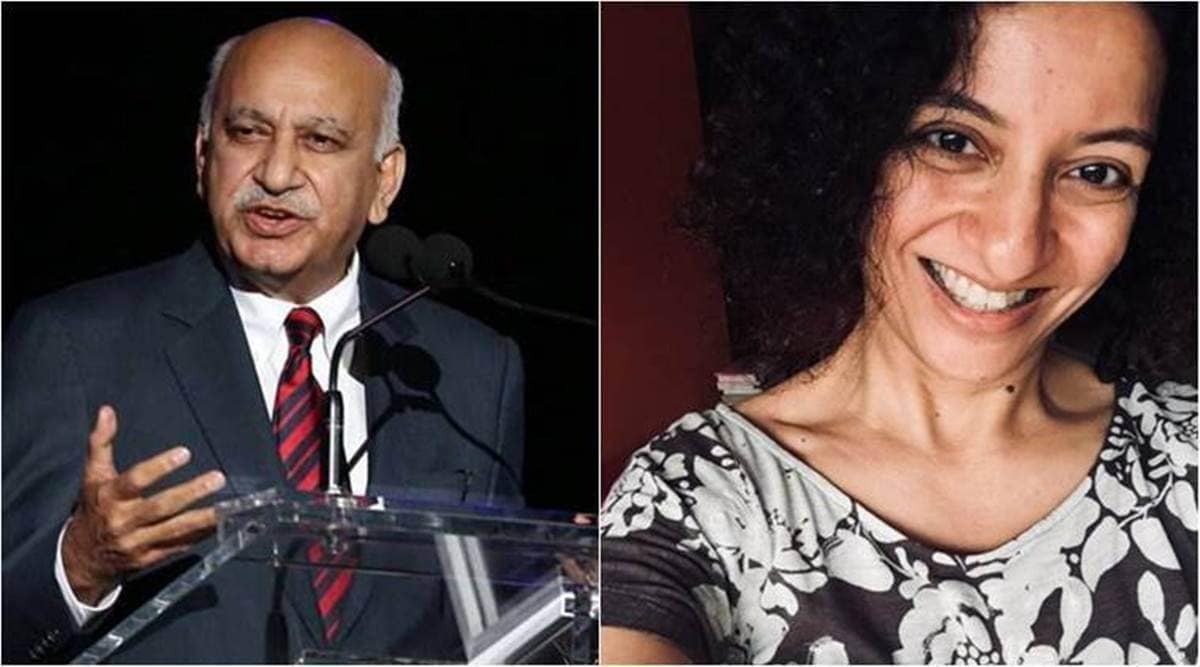 MJ Akbar and Priya Ramani. (File)
MJ Akbar and Priya Ramani. (File) Observing that there was social stigma attached to women who face sexual harassment, a Delhi court Wednesday acquitted journalist Priya Ramani in connection with a criminal defamation case filed against her by former Union Minister MJ Akbar.
Akbar had sued Ramani over allegations of sexual misconduct and harassment. With several other women making similar allegations against him, Akbar resigned as Minister of State for External Affairs in October 2018.
Additional Chief Metropolitan Magistrate Ravindra Kumar Pandey acquitted Ramani observing that he accepts “the possibility of defence of accused that she disclosed her truth on the basis her own testimony and that of defence witness, Niloufer Venkatraman.”
The court observed that “there was systemic abuse at workplace and said that there is social stigma attached allegations of sexual harassment.”
The court said that “even a man of social status can be a sexual harasser. Right of reputation can’t be protected at the cost of right to dignity.”
On Ramani using the #MeToo platform to put forward her grievances, the court said “a woman has the right to put her grievance even after decades.”
Following the pronouncement, Ramani told reporters, “This battle has been about women, hasn’t been about me. I just happen to represent all the women who spoke up, the women who spoke up before me and the ones who spoke up after me. I thought this was a very apt judgement. My victory will definitely encourage more women to speak up and it will also make powerful men think twice before they take victims to court. Don’t forget that I was the accused in this case. I was accused just for speaking up”.
Akbar did not look up as the verdict was being read out and left the court room surrounded by his lawyers.
The case has been argued for over two years, with Ramani and Akbar’s advocates often getting into heated verbal arguments. Ramani’s lawyers, headed by senior advocate Rebecca John, had during her arguments told the court that Ramani had “pleaded truth as her defence and that her disclosures were for public good.”
Akbar’s lawyers, headed by senior advocate Geeta Luthra, had argued that Ramani’s Vogue article piece about the behaviour of male bosses following the Metoo movement and the allegations surrounding Hollywood producer, Harvey Weinstein, was entirely on MJ Akbar.
Luthra had argued that Ramani through her article and subsequent tweets, in which she disclosed that the introduction to her story was based on her experiences with Akbar, was defamatory and that he was a man of stellar reputation. It was argued in court that the incident disclosed by Ramani, that during an interview at the Oberoi hotel in Mumbai, Akbar behaved in a sexually inappropriate way was in fact a “figment of her imagination.”
John, on the other hand, had argued that the Vogue article’s introduction was “not the whole piece” and the latter half of the article “was about the behaviour of male bosses and allegations against Harvey Weinstein.”
On Akbar’s reputation, John had told the court that “they opened the door of Akbar being a man of great reputation. I have every right to contest it through my own evidence.”
On why Ramani did not disclose the hotel Oberoi incident, John had argued that at the time there was no mechanism to report such incidents and that in 2018 the Metoo platform gave women a safe space to talk about these incidents.